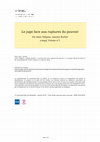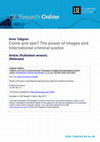Book Chapters by Immi Tallgren
Retrials: The New Histories of International Criminal Law (Immi Tallgren, Thomas Skouteris eds, Oxford University Press), 2019
Retrials: The New Histories of International Criminal Law (Oxford University Press), 2019
Histories of international criminal law are not protected by the double jeopardy rule. As the tit... more Histories of international criminal law are not protected by the double jeopardy rule. As the title of this volume indicates, we are boldly calling for a retrial, in fact many of them: retrials. We also fully accept that ours shall not remain the final word, the binding judgement. On the contrary, with this collection we are pleading for many more new histories of international criminal law.
Frontière(s) au cinéma (Estelle Epinoux-Pougnant, Magalie Flores-Lonjou, Vincent Lefebve eds, Mare & Martin), 2019
International Law and Religion: Historical and Contemporary Perspectives (M. Garcia-Salmones Rovira, M. Koskenniemi, & P. Amorosa eds, Oxford University Press), 2017
The Rome Statute of the International Criminal Court: A Commentary (third edn, Otto Triffterer, Kai Ambos eds, Verlag C.H. Beck), 2016
Historical Origins of International Criminal Law: Volume 2, 2014
In place of a complicated empirical world, men hold to a relatively few, simple, archetypal myths... more In place of a complicated empirical world, men hold to a relatively few, simple, archetypal myths, of which the conspiratorial enemy and the omnicompetent hero-savior are the central ones. In consequence, people feel assured by guidance, certainty and trust rather than paralyzed by threat, bewilderment, and unwanted personal responsibility for making judgements. 1

Critical Approaches to International Criminal Law: An Introduction (Christine Schwöbel ed, Routledge), 2014
The criminal accountability euphoria that marked the 1990s culminated in the adoption of the ICC ... more The criminal accountability euphoria that marked the 1990s culminated in the adoption of the ICC Statute in 1998 and its entry into force in 2002. The expectations for international criminal justice are expressed in high ideals, to 'endeavour to seal the primacy of the rule of law, due process and human rights for future generations', in the words the ICC prosecutor in 2013. A few famous exceptions exist, such as Justice Radhabinod Pal, an Indian judge at the Tokyo Tribunal. Today, efforts are undertaken to give a standing and a voice to those who were absent or silent in international criminal justice. States should benefit from development programmes under the auspices of the ICC Assembly of States Parties, donor states and the NGO community, comprising external expertise and evaluations to aid developing national legislations and judicial systems to make them, by carrots and sticks, up to the standards set by the ICC statute and practice.
The Hidden Histories of War Crimes Trials (Kevin Heller, Gerry Simpson eds, Oxford University Press), 2013
This chapter examines the Finnish war-responsibility trial in 1945–6. The trial demonstrates the ... more This chapter examines the Finnish war-responsibility trial in 1945–6. The trial demonstrates the difficulty of the national exercise of jurisdiction based on an international obligation; how limited and contingent the instrument of criminal justice may prove to be in elucidating historical contexts or addressing collective loss; and the far-reaching and powerful effects criminal trials.
Commentaire du Statut de Rome de la Cour Pénale Internationale (Julien Fernandez, Xavier Pacreau eds, Editions A. Pedone), 2012
The Individual as Subject of International Cooperation in Criminal Matters – A Comparative Study (Albin Eser, Otto Lagodny, Christopher L. Blakesley eds, Nomos), 2002
Articles by Immi Tallgren

E-legal : Revue de droit et de criminologie de l'Université libre de Bruxelles, 2018
Les rapports de force entre l’autorité judiciaire et les autres composantes du pouvoir constituen... more Les rapports de force entre l’autorité judiciaire et les autres composantes du pouvoir constituent le ressort de nombreux films. L’objet de cet article est d’analyser ces rapports en période de crise aiguë : catastrophe naturelle, guerres ou révolutions. Face à ces ruptures, comment le cinéma rend-t-il compte du rôle du juge ? Le cinéma met en scène l’effondrement des systèmes judiciaires, mais aussi leur mutation, ou leur mise sous tutelle, qu’elle soit le fruit d’une crise nationale ou d’une intervention extérieure. Dans ces situations, le cinéma figure et défigure le juge : il sera tantôt un automate ou un démissionnaire, serviteur zélé du droit du plus fort ; tantôt un acteur à part entière des bouleversements en cours, soit par souci de garantir ce qu’il imagine être l’ordre des choses, soit pour s’élever contre cet ordre, au nom de valeurs qu’il croit supérieures. Mais le cinéma n’affirme-t-il pas aussi qu’en période d’exception, la règle est que la justice peut se passer de juge ?

International Criminal Law Review, 2017
What kind of interdisciplinary approaches on images and international criminal justice (icj) are ... more What kind of interdisciplinary approaches on images and international criminal justice (icj) are there to be explored? What could they bring to scholarship and institutional practice? This article provides a panorama of images and their roles, analysing the power of persuasion and attraction of images and its shadows. The power of images of suffering is discussed in light of critical scholarship on solidarity and humanitarianism. Another kind of power emanates from images by institutions and advocacy where justice is ‘seen to be done’. These powers are intertwined; images of suffering derive legitimacy and veracity from the format of their deployment, whereas images of institutional authority fuel on affects and their appeasement in the order the institutions aim at narrating, also by images. Engaging with interdisciplinarity, the article invites critical attention to what happens when images are powerful, and on the subjectivities and hierarchies involved, thereby reaching beyond the images.
London Review of International Law, 2017
Tokyo Trial is a historical TV series on the International Military Tribunal for the Far East in ... more Tokyo Trial is a historical TV series on the International Military Tribunal for the Far East in Tokyo. Its heroes are the audacious dissenting judges Pal and Röling—a rare choice that seems to point to a critical counter-narrative of international criminal justice. This article suggests multiple readings of Tokyo Trial that open up historiographical and ideological struggles beneath the tropes of an entertaining ‘docu-drama’.
Journal of International Criminal Justice, 2015
When 'we' want to punish the most serious crimes of concern to the international community as a w... more When 'we' want to punish the most serious crimes of concern to the international community as a whole, who is 'we'? The article embarks on an excursion where 'we' in the contexts of international criminal law is pictured as 'humanity' or 'international community', as well as a variety of other collective subjects. The article examines how the rhetorical ambiguities of we-talk may serve both for alignment and persuasion, and usurpation and exclusion. More than a banal rhetorical device, does we-talk potentially grow into an instrument of persuasion and assimilation, totalizing parts into a whole that it controls or suppresses? What would that mean for 'the pursuit of global justice'?
Revue interdisciplinaire d'études juridiques, 2013

European Journal of International Law, 2002
Intolerable large-scale crimes seem to render the justification of international criminal justice... more Intolerable large-scale crimes seem to render the justification of international criminal justice self-evident. It just feels right. But why? This article exposes international criminal justice to the 'why' question by applying the most frequently evoked models of the working mechanisms of rational, utilitarian, enlightened criminal justice. It demonstrates that the basic pre-conditions for their effective working according to the prevailing theories do not exist or get fulfilled. Regardless of the common outspoken statements referring to utilitarianism, the real answers to the 'why' question seem to echo the retributivist tone of justification. Everybody knows that prevention does not work, even if we hope it might one day. Everybody knows, but the knowledge has no consequences. Prevention is cited simply because of the void of alternatives, the rational ones. What would be left if the international criminal justice system were to stripped of its utility and rationality? International criminal justice comes close to a religious exercise of hope and perhaps deception. The ideology of a disciplined, mathematical structure of responsibility serves as a relieving strategy to measure the immeasurable. The seemingly unambiguous notion of guilt creates consoling patterns of causality in the chaos of intertwined problems of social, political and economic deprivation surrounding the violence. The article concludes with a question: Could the rational and utilitarian purpose lie elsewhere than in the prevention or suppression of criminality?
Canadian Journal of Law and Jurisprudence, 2002

Nordic Journal of International Law, 1998
Recent efforts in the United Nations to establish a comprehensive system of international crimina... more Recent efforts in the United Nations to establish a comprehensive system of international criminal repression by creating a permanent international criminal court are by no means free from doubts regarding the possibility ever to enforce such law. The preamble of the draft statute prepared by the International Law Commission states the basis on which the court is to assert jurisdiction in an ambitious manner: it is the "International Community", joining against "the most serious crimes of international concern". The project cannot, however, ignore decades of realist criticism against the assumption of the existence of an international community that is ready to accept an international criminal jurisdiction. In the negotiations, this contradiction is dealt with by a technique provided with an ambiguous name: "complementarity", i.e. the coordination of the tasks of the international and domestic jurisdiction. The writer discusses the various ideas and proposals presented under the heading of "complementarity" in order to examine the tension between communitarian and sovereignty-based strands in the international project to create an effective criminal jurisdiction.
Books by Immi Tallgren
A Study of the ‘International Criminal Justice System': What Everybody Knows?, 2001
Papers by Immi Tallgren
Oxford University Press eBooks, May 11, 2023











Uploads
Book Chapters by Immi Tallgren
Articles by Immi Tallgren
Books by Immi Tallgren
Papers by Immi Tallgren